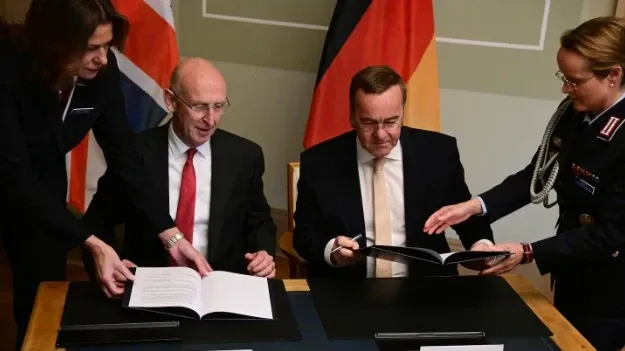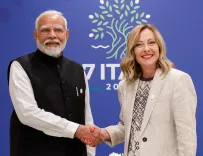Are Germany and Britain set to develop new 'deep precision strike' weapons?

Synopsis
Key Takeaways
- Germany and Britain are developing a new long-range weapon system.
- The system will have a range exceeding 2,000 km.
- This initiative addresses urgent security threats in Europe.
- Collaboration aims to strengthen NATO deterrence.
- Both nations are pursuing greater military independence from the US.
Berlin, May 16 (NationPress) German Defence Minister Boris Pistorius and visiting British Defence Secretary John Healey have reached an agreement to initiate the development of a new "Deep Precision Strike Capability" system, designed to target ranges exceeding 2,000 km.
The current security landscape necessitates the advent of such long-range weaponry to address the "Deep Precision Strike" capability gap, as highlighted in a statement from the German Defence Ministry following their meeting.
The British Ministry of Defence indicated that this new 2,000-km precision deep strike capability will represent one of the most sophisticated systems ever created by Britain, aiming to protect the British populace and bolster NATO deterrence while enhancing both British and European defence sectors.
Pistorius emphasized that the development of these missiles has commenced, underscoring their critical importance for European security.
"The current threat environment makes it abundantly clear that we must address all capability gaps," stated Pistorius. "And we must do this as expeditiously as possible."
In light of uncertainties regarding Washington's commitment to European security, governments across Europe are seeking to establish greater independence from U.S. military technology.
Both Germany and Britain also committed to enhancing collaboration on equipment systems, countering undersea threats, and improving connectivity between their air forces.
The two Ministers discussed support for Ukraine and the upcoming NATO summit in June, where defence budget sharing among member nations is expected to be a focal point.
The new German federal government has pledged to increase its national defence spending and to build a formidable military.
German Chancellor Friedrich Merz remarked in February that Europe must strive for "real independence" from the U.S., whose leadership appears "largely indifferent" to Europe's fate.
The Defence Ministers also highlighted other collaborative efforts, including joint procurement of torpedoes and the creation of a new forum to unite defence firms from both nations.
Healey stated, "NATO's European nations must do more to bolster European security. The most effective way to achieve this is for leading countries like Germany and the UK to collaborate more closely."
Earlier on Thursday, Germany's Foreign Minister Johann Wadephul expressed support for a proposal to increase defence spending to five percent of GDP.







